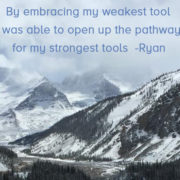The Power Of Choice
A few weeks ago while getting ready for a night out with my friends, I looked in my closet and had an emotional break down. Everything in my closet was either something that I had worn 15 times, was outdated, or no longer fit. I was feeling old, super unattractive, and just needed to put something on that I felt good in. I had nothing. I sat on the edge of my bed and cried for a few minutes before I managed to shake it off, throw on my old faithful jeans, a well worn top, and head out for a few beers.
Heading to the pub it occurred to me that my reaction may have been over the top and fueled by some well timed hormones but, that it was totally understandable. We often don’t put a lot of thought into the choices we make or why we make them but the clothes we wear can be reflective of how we are feeling that day. We may choose an outfit that boosts our energy, one that covers our insecurity, one for the comfort on days we aren’t feeling well, or for security in a scary situation. We dress our best when we want to feel our best. For most of us, we can assess and choose what we want, when we want because we have that power and control in our own lives.
For many people we support, something as simple as choosing their own clothes can be a major battle. They may spend time pouring over different coloured socks, trying to decide which one is right for the day or wear a particular top that they love until it is hanging in tatters. As support people, we sometimes make choices for the folks we support without giving it a second thought. We know what the weather is going to be, we know what looks best, so it’s natural for us to grab something and simply help the person to get dressed.
This is just one example of the ways that people can have a lack of control in their own lives and it’s pretty minor. Many people don’t even argue, they are simply happy to wear whatever is offered or what is in their closet. It may not even occur to them to demand the choice of their outfit for the day. It is on us as gentle teachers, to understand that on a very basic level the people that we support often don’t have control over even the simplest choices within their lives. It is important for us to recognise and honour the areas that we can give back control to the people we support, in as many ways as possible, even if it means that it takes 15 extra minutes to get ready in the morning.
Including a person in their choice of clothes, what’s for supper, what they are going to watch on TV and a dozen other small decisions that we take for granted every day allows people to have control over the things in their lives that they are able to. It can also minimize the struggle for control in areas that we are not able to give control back, things like medications, restrictions for safety etc. By empowering people to feel in charge most of the time, you will also empower people to let go of control when they need to.
As for me, I have a much needed shopping trip in my near future!










